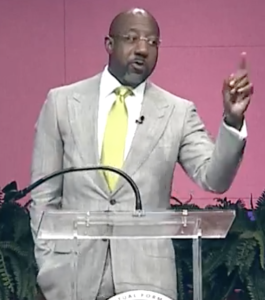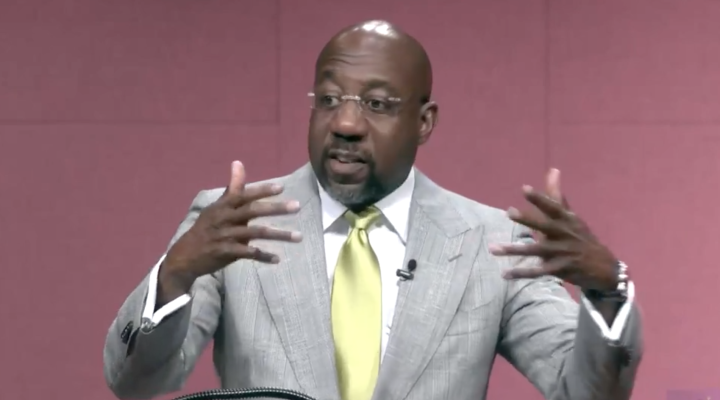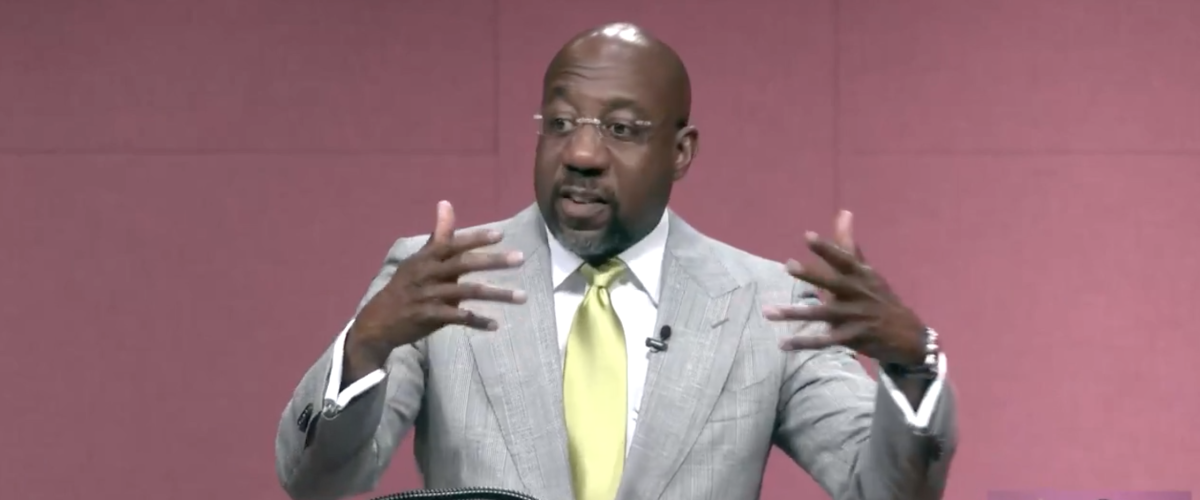Marginalized Americans needn’t settle for the bigotry and division gripping the nation any more than a paralytic healed by Jesus had to settle for ancient prejudices against people with physical disabilities, U.S. Sen. Raphael Warnock said in an Aug. 28 sermon at Friendship-West Baptist Church in Dallas.
And just as the friends of the paralyzed man in the biblical story were able to bypass the crowds to lower him into the house where Jesus was teaching, so Black Americans must be diligent and trusting in their search for justice, said Warnock, senior pastor of Ebenezer Baptist Church in Atlanta.
“I came all the way from Atlanta just to tell you that we can make a way out of no way,” he told the South Dallas congregation.
Warnock pointed to himself as an example, reminding worshipers of his and fellow Democrat Jon Ossoff’s against-the-odds 2020 election victories.

Raphael Warnock
“I’m so proud that the state of Georgia, a state in the old Confederacy, did an amazing thing by sending its first Black senator and sending its first Jewish senator to the United States Senate in one fell swoop over against all the racism and antisemitism and the bigotry and the xenophobia,” he said.
More amazing still was the timing of his and Ossoff’s elections, he added. “Georgia stood up and gave the whole nation an opportunity to fight by sending a Black man and a Jewish man to the Senate on the heels of five years of unabashed, unembarrassed, unashamed bigotry.”
Returning to the passage in the Gospel of Luke, Warnock compared the crowds that initially blocked the paralytic and his friends from Jesus to the racism and entitlement that keeps Blacks and other marginalized groups from reaching their potential in America.
“Is there anybody who’s ever felt locked out and blocked out and marginalized so that you had to cry out?” he asked.
The paralytic’s friends may well have experienced opposition from those fearful of losing their place, Warnock said, alluding to the white supremacist “Great Replacement” theory, which holds that people of color are attempting to replace whites in America and in other majority Caucasian nations.
“I can hear some (in the crowd) say, ‘You shall not replace us.’”
But the struggle the man and his friends faced to see Jesus likely would have been opposed more by feelings of entitlement than outright violence, Warnock said.
In Luke, members of the crowd “were just in the house and Jesus was in the center of the house … and because of where they were positioned in the house, they were conveniently unaware of what was happening behind them.”
“Based on where you sit, you may not see what you are doing to your brother, and that’s what is happening in our beloved country right now.”
It’s much the same today with white privilege, he said. “Based on where you sit, you may not see what you are doing to your brother, and that’s what is happening in our beloved country right now. In our beloved America, all families have family problems, all families have a complicated story and there are some folks who are stirring up the pot of division because they are playing on the anxieties of those who are used to sitting where they sit. And if you are accustomed to privilege, (then) parity and equality might feel like oppression.”
Warnock also connected the concept of being paralyzed with the theme of racial and political powerlessness in America.
“Paralysis is anything that keeps you powerless to act on your own behalf or on behalf of others and which robs you of agency and activity, stifles the best of your creative skills, short circuits your intellectual gifts, hijacks your highest hopes, destroys your courage to dream, eviscerates your vision, exhausts your enthusiasm, depletes your sense of determination, annihilates your ambitions, ties up your talent, weakens your willingness to work,” he said.
Yet, before physically healing the man, Jesus tells him his sins are forgiven despite the fact “he came looking for healing, not forgiveness,” Warnock said.
“Jesus understands what happens when you internalize stigma. Jesus understands when a society blames the victim.”
Jesus’ statement was in fact healing because it undermined the assumption that physical handicaps resulted from sin, the pastor explained. “Jesus understands what happens when you internalize stigma. Jesus understands when a society blames the victim. You start calling yourself the name others are calling you. The man had been paralyzed by what he had internalized. All he needed was someone to tell him, ‘Brother, you’re free.’”
The same lesson applies to those living with racism in America, he declared. “Don’t care how much they marginalize you. You are a child of the living God. Once you know who you are, once you know whose you are, walking is easy.”
The Jan. 6, 2021, attack on the U.S. Capitol was a glaring statement that the forces of bigotry are not giving up, a fact that should motivate people of faith to seek to transform the nation into a “beloved community” instead of a divided one, the senator said.
“We are trying to push America toward the dream. We’re fighting for the very soul of the country. E Pluribus Unum — out of many, one. And we are the latest group of Americans who get to decide whether we are going to give in to the forces of division or are we going to push the nation closer toward this ideal. I choose beloved community.”
Related articles:
A vote is ‘a kind of prayer,’ Warnock says in first Senate speech
In Georgia, demonizing Black Liberation Theology yet again | Analysis by Steven Harmon


